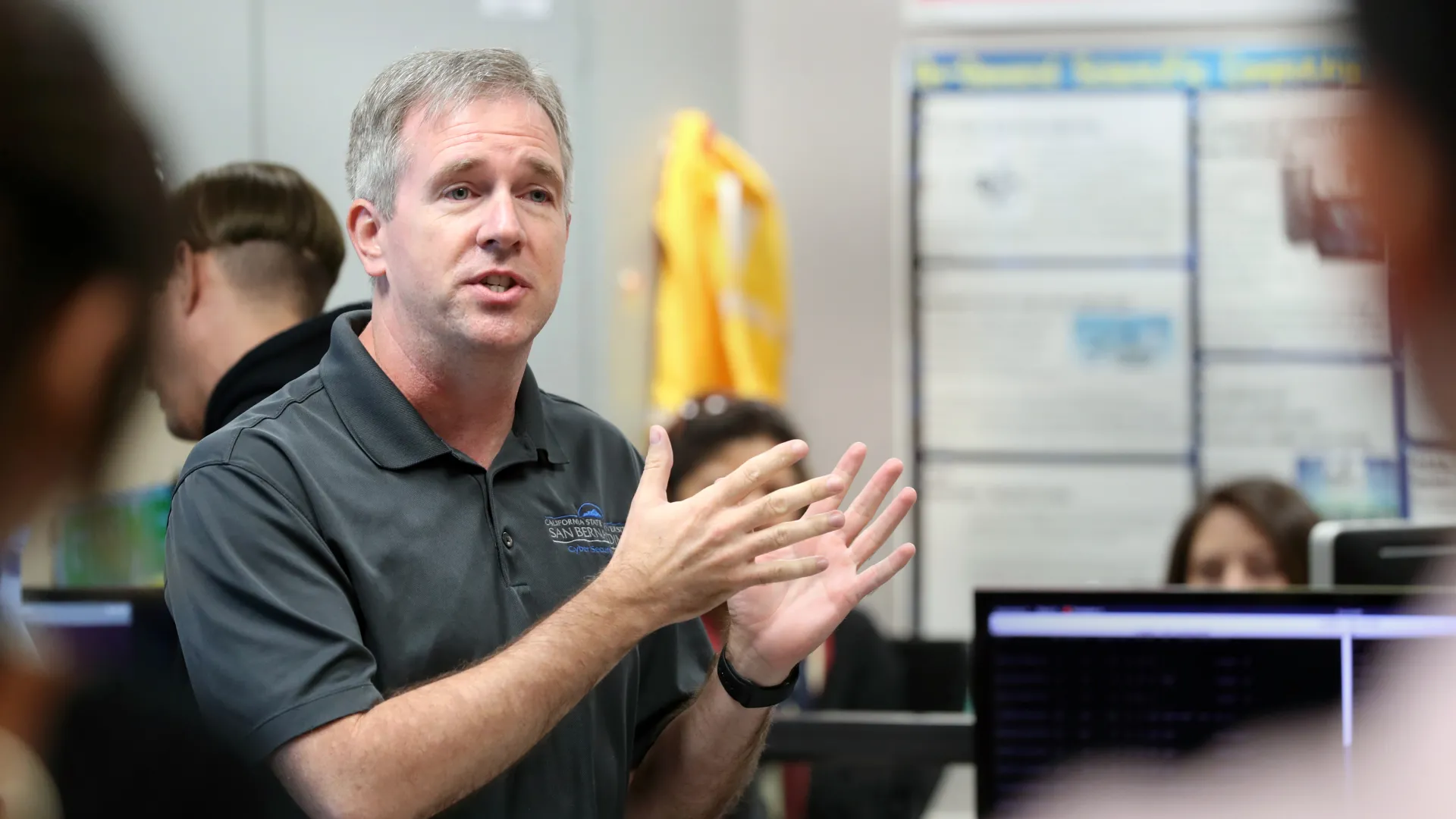Joe Gutierrez | CSUSB Office of Strategic Communication | (951) 236-4522 | joeg@csusb.edu

In testimony before a congressional subcommittee, Tony Coulson, director of the Cybersecurity Center at Cal State San Bernardino, told committee members that the nation is in a crisis situation because of a 500,000 person shortage in the cyber workforce.
“Let that number sink in,” Coulson told members of the House Subcommittee on Homeland Security, Infrastructure Protection and Innovation. “That’s an absurd number. If this was doctors and nurses, there would be a national outcry.”
Coulson was one of four speakers who had been invited to testify before the House subcommittee. The theme was “The Cyber Talent Pipeline: Educating a Workforce to Match Today’s Threats,” and it marked the first time that Coulson, a professor of information decision sciences at the CSUSB Jack H. Brown College of Business and Public Administration, spoke before Congress.
The subcommittee hearing can be seen on YouTube and on the Committee on Homeland Security website.
“Cal State San Bernardino is committed to solve this workforce problem. Working with our partners at the National Security Agency Centers of Academic Excellence program, Cal State San Bernardino established and leads the National Centers of Academic Excellence Community in Cybersecurity, a strong collaboration of 335 NSA designated community colleges and universities all working to solve this cyber workforce shortage.
Coulson said the program also partners with many federal agencies including the NSA (as program managers), Department of Homeland Security, National Institute of Standards and Technology (NIST), the FBI and the National Science Foundation.
“This unique collaboration provides a great vantage point to see gaps, silos and duplication and develop solutions through collaboration,” Coulson said.
One of the gaps is in educating and developing K-12 students in cyber education.
“Look we know that K through 12 is a huge opportunity and there’s a lot of activity in this space and there’s a lot of investment through a lot of agencies, but there are still gaps. There’s a lot of work to be done here,” Coulson said. “We need to increase diversity but also in rural and homeschool networks, and so the Centers of Academic Excellence Community just released a program focusing on rural and homeschooling.”
He added that along with helping get Advance Placements in cyber education into the national curriculum, CSUSB has put together extracurricular activities such as camps and cyber competitions.
“As a matter of fact, the GenCyber program at Cal State San Bernardino that we originally partnered with Cyber.org., the genesis of that camp at Cal State San Bernardino that’s now affected thousands of kids led to a national Girl Scout badge,” Coulson said.
The United States also faces a significant cyber research workforce gap.
“We need to home grow research skills, so Cal State San Bernardino and its (CAE Community) partners in the community just launched the Information Security Research Education Program, a unique program where we take technical directors from the national labs and the National Security Agency and others, and work with diverse student teams around the country and a variety of institutions to solve real world technical problems,” Coulson said.
The other witnesses included: Kevin Nolten, director of academic outreach, CYBER.ORG; Ralph Ley, department manager of the National and Homeland Security Workforce Development and Training, Idaho National Laboratory; and Max Stier, president and CEO, Partnership for Public Service.
In its designation as a national center, the CSUSB Cybersecurity Center has worked to establish and manage three CAE-C Communities of Practice, coordinate cutting-edge research, establish and support five regional hubs around the country, and support cybersecurity education nationally.
The center, from 2010-2020, has brought in over $28 million worth of grant sponsored programs from entities that include the National Initiative for Cybersecurity Education (NICE), the NSA, the Department of Defense, the National Cybersecurity Training and Education (NCyTE) Center, and the National Science Foundation. Through the grant sponsored activities of the center, students can compete for scholarships, participate in national conferences, and research emerging cybersecurity issues.
The CAE in Cybersecurity Community provides a unique partnership of schools designated by the NSA as Centers of Academic Excellence in Cyber. As the National Center, Cal State San Bernardino works with institutions of higher learning on a range of programs ranging from apprenticeships, K-12 educational programs, cyber defense, competitions and cybersecurity research.
In 1999, the NSA launched the Centers of Academic Excellence in Information Assurance Education (CAE-IAE) program. Under this program, an institution could receive the CAE-IAE designation if it passed rigorous curriculum and program requirements. By May 1999, seven schools became designated as a CAE, and soon, many more institutions joined the ranks of CAE-designated institutions. While the CAE-IAE program initially formed to address the shortage of intelligence community professionals, the program later expanded to address the lack of qualified cybersecurity professionals in the workforce. The newly named CAE programs in Cyber Defense (CD), Research (R) and Cyber Operations (CO) now include over 330 academic institutions and over 100,000 active students.
CSUSB, a Hispanic-Serving Institution, is recognized globally for its Jack H. Brown College of Business and Public Administration and nationally for its leadership in developing the country’s cybersecurity workforce.